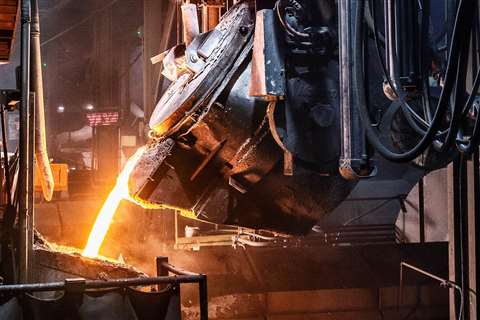
Waupaca Foundry keeps its attention on customer support, employee safety
17 February 2021
Proving their mettle: Good suppliers stay the course during challenging times in the same way certain friends can be counted on when the going gets tough.
Good suppliers stay the course during challenging times in the same way certain friends can be counted on when the going gets tough. There have been a lot of mettle-testing opportunities at every step in the supply chain over the past year.
Waupaca Foundry, a producer of cast and machined gray and ductile iron for a diverse range of customers, implemented a plan in January 2020 to ensure its employees and customers would be protected if COVID-19 spread beyond China. By March 2020, of course, it had become a global pandemic and businesses throughout the United States were labelled as essential or non-essential.
“We quickly evaluated our supply chain,” said John Wiesbrock, executive vice president for Waupaca Foundry, Waupaca, Wis., “because we are an essential business at almost all of our locations. Our customers build components such as transmissions that go on ambulances, on commercial vehicles to provide goods and services and on agriculture equipment to provide food for the globe.”
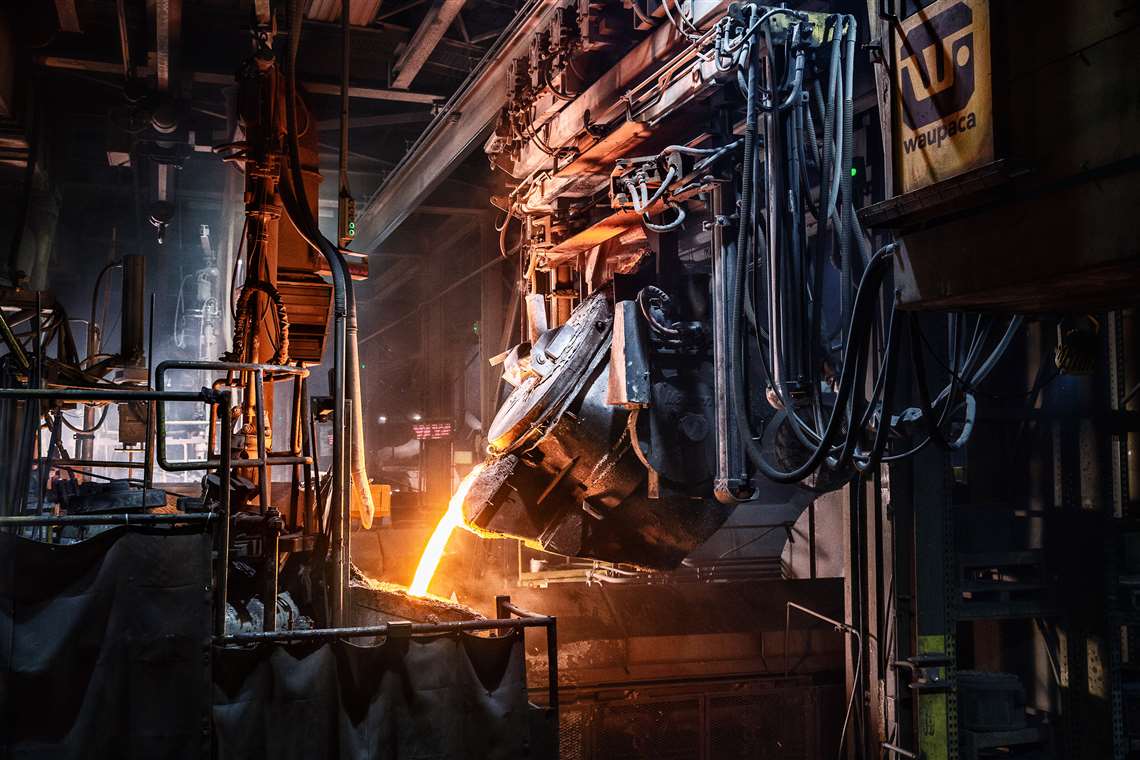 A vertical molding transfer ladle delivers molten metal in Waupaca Foundry’s plant in Marinette, Wis.
A vertical molding transfer ladle delivers molten metal in Waupaca Foundry’s plant in Marinette, Wis.
That meant that melt furnaces at its foundries – Plant 1 and 2/3 in Waupaca, Plant 4 in Marinette, Wis., Plant 5 in Tell City, Ind., and Plant 6 in Etowah, Tenn. – needed to be fed. With an appetite that consumes more than 9500 tons of ferrous metal a day, that was not a small task. Much of the foundry’s feedstock is typically sourced from factories that were temporarily closed in an effort to “flatten the curve.” When the manufacturing of automobiles, light-duty trucks and household appliances stopped, so did the flow of prime scrap metal.
“It was a very delicate balance with the supply chain and we had to reach further out for scrap,” said Wiesbrock. “We would normally be buying from a 100- to 300-mile or more radius around our plants but we were bringing in material from as far as 1000 miles away.
“We have great long-term working relationships with our supply base and that paid off. We had to be creative and they had to be creative. Our supply chain partners have done an awesome job working with us, not only when we were all trying to figure out what it meant as different states were locking down at different cadences and with different rules, but even today in what we would consider a new norm.”
Wiesbrock said the situation often changed by the hour. Rail cars full of scrap already en route to one of their foundries would get held up at a switch because of COVID-related staffing shortages along the line. “Then we would deploy trucks and other resources to get the material to us,” he said. “You can’t have only one supply chain for critical items. So luckily — and strategically — we have different streams in place at all times.”
At each location, the company also maintained the safety of its 4500 employees. Work schedules were altered when needed and CDC guidelines continue to be followed.
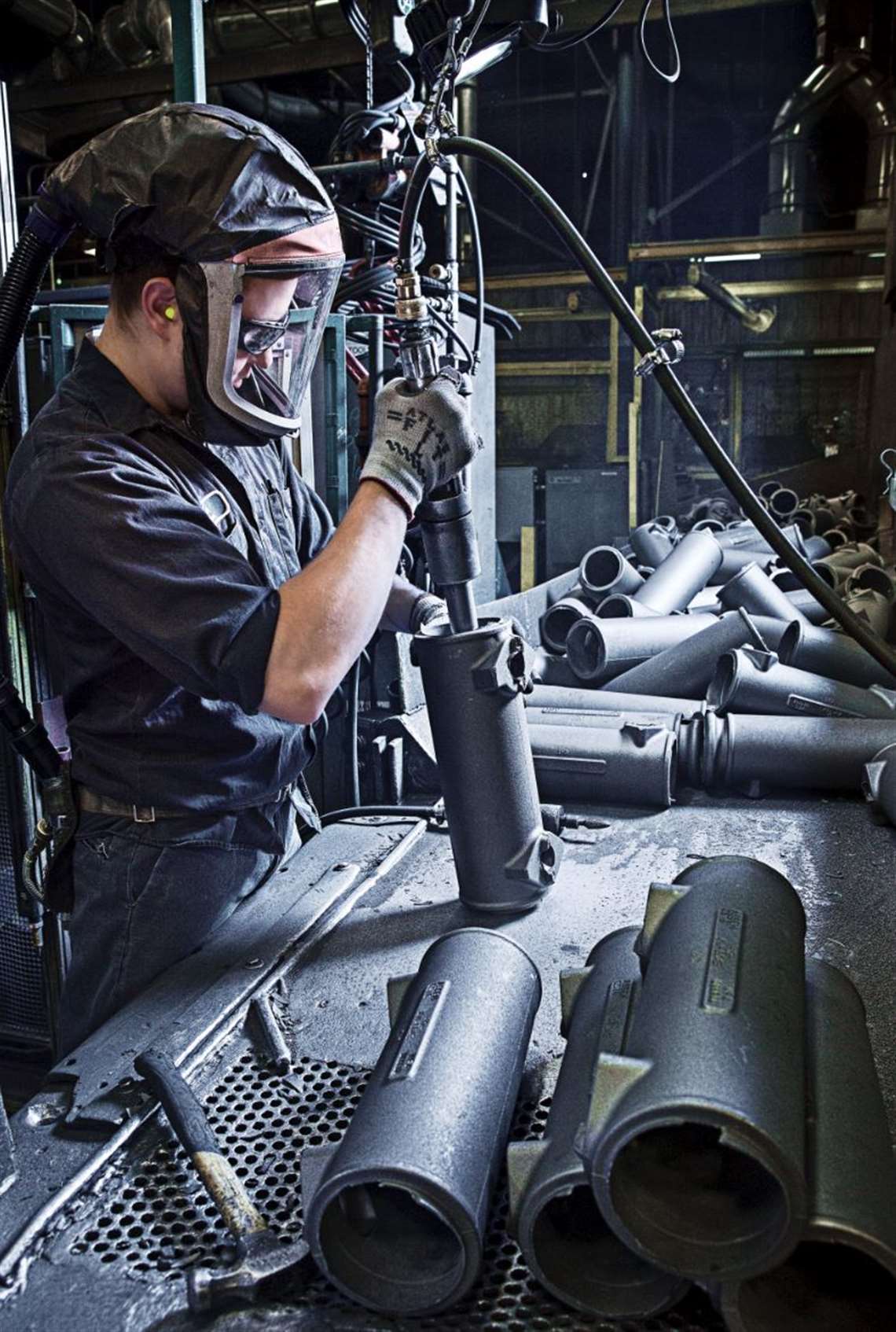 A finishing room operator at Waupaca Foundry Plant 1, a gray iron foundry in Waupaca, Wis., cleans and removes excess metal from a casting that will be assembled on a diesel engine.
A finishing room operator at Waupaca Foundry Plant 1, a gray iron foundry in Waupaca, Wis., cleans and removes excess metal from a casting that will be assembled on a diesel engine.
Communication key
While much of the company’s focus centered on keeping hundreds of tons of quality scrap metal flowing to each its foundries every day, good old-fashioned communication was also key.
“We started a weekly written communication to all of our customers telling them what we were going to run, what weeks we would run and what plants,” said Wiesbrock. “We did that because the businesses we support were critical and essential and we could not operate every day. We worked closely with our customers to ensure that we met the orders that they needed.”
As a result, during the third quarter of 2020, Waupaca Foundry was given a supplier award from a major diesel engine manufacturer in recognition for going “above-and-beyond” to prevent line-down situations or high freight charges. It was also given an “outstanding partnership” award from a heavy-duty drivetrain manufacturer, “An award for outstanding performance that would be given out in a normal year,” said Wiesbrock, “and it doesn’t even talk about the fact that we’re all dealing with a global pandemic.”
The company stepped up its communication internally, as well. “Some of our employees may have wondered why we were still working,” he said. “But when you start talking about heavy rescue trucks or ambulance transmissions and drivetrain parts for new equipment or to keep things running, it was eye-opening.
“We over-communicated, and that’s what made us successful. We had the material. We met our customer’s orders, and we kept our people safe. That’s what makes Waupaca Foundry what it is — we have a very strong brand that we’re proud of. That’s just another way of saying that we’re there for our customers.”
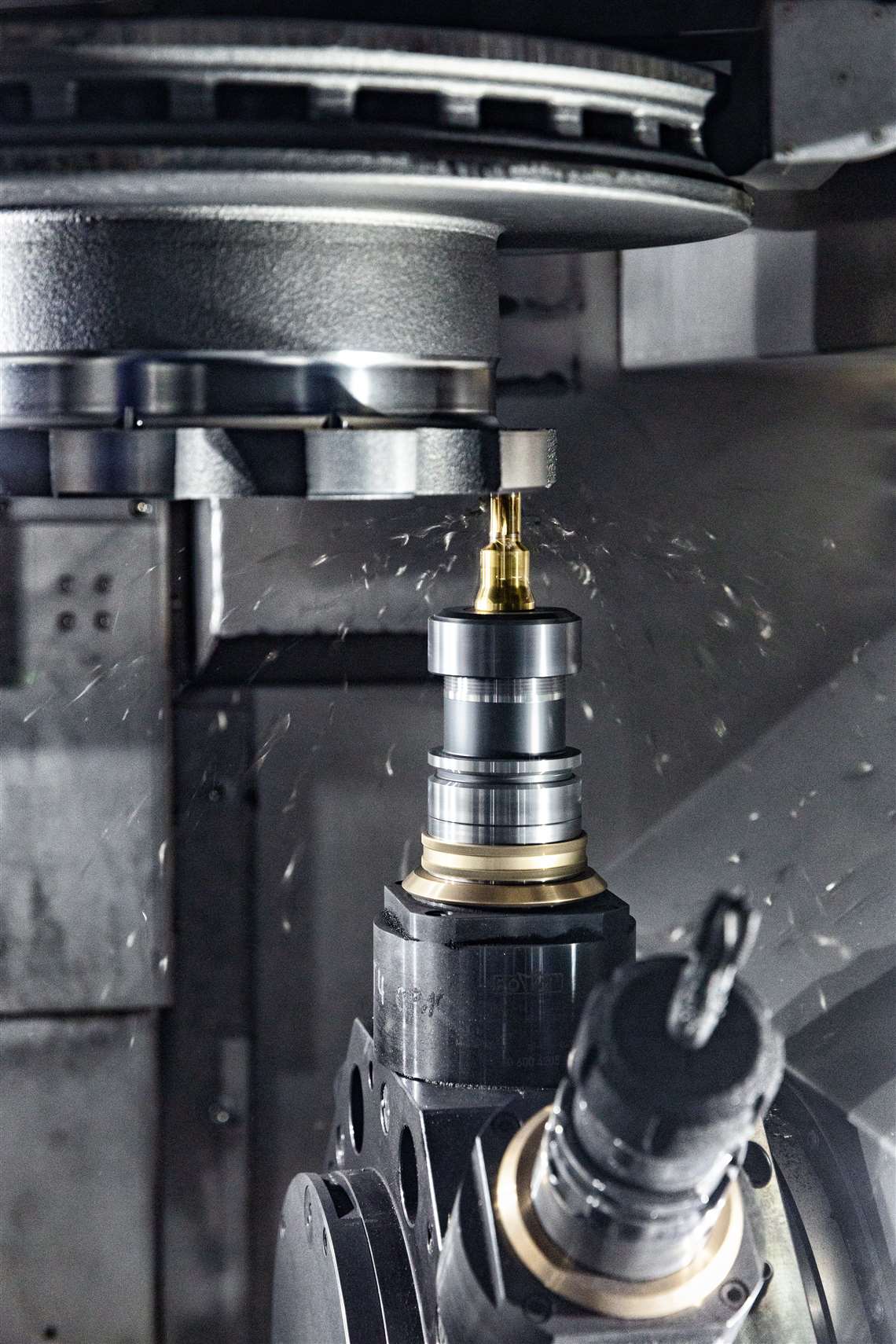 Close-up of a commercial vehicle air disc brake dry machining in Waupaca, Wis.
Close-up of a commercial vehicle air disc brake dry machining in Waupaca, Wis.
Machined on-site
Prior to the pandemic, Waupaca Foundry demonstrated its customer dedication when it opened a machining center on Waupaca’s east side. The company took an empty building adjacent to its Plant 2/3 gray iron foundry and turned it into a 50,000 sq.ft. manufacturing space – with much of the equipment installation and programming performed by company personnel. Wiesbrock said employees even took it upon themselves to repair and paint the walls, converting a battered old printing shop into a high-tech showplace.
The facility’s staff work alongside a fully automated material handling system that uses robots to unpack and pack parts onto skids while automated guided vehicles (AGV) help reduce cycle times as they transfer parts to one of five machining cells. Twin-spindle CNC lathes produce components to tight tolerances, said the company.
“Our global markets are changing, and customers want a higher level of value-added services,” said Wiesbrock when the facility opened in April 2019. “A vertically integrated model such as this takes the waste out of the supply chain for customers.”
Air disc brakes machined in the facility are used by Class 6 through 8 truck manufacturers. Some of the parts have long been cast in Waupaca, allowing the company to provide a one-stop shop for component production.
“The machining center has opened a new avenue of value-add for us,” said Jason Grasman, manufacturing machining manager, Waupaca Foundry. “Typically, we would cast these parts and send them off to be machined. This facility allows us to save the transportation cost and do it all in-house. We can offer the customer less complexity from a supply chain standpoint.
“Now we can also take the chips from the machining process and recycle them through the foundry. We didn’t have the ability to do that with third party operations, so that also cuts down on waste and saves some cost.”
Process control
Most equipment manufacturers do not choose their partners based only on supply chain reliability during a global pandemic – at least that was the case before 2020. They want solution providers.
Waupaca Foundry’s overall customer approach can be summed up in a quote from retired President and CEO Gary Gigante (2007 to 2016): “Waupaca Foundry doesn’t sell castings, we sell solutions.” The company said it has a history of quality and innovation — key elements to meeting the needs of manufacturers — but when it comes to castings, process control is an important strength.
Within each material type (i.e., gray or ductile iron) there are specifications that define multiple grades (such as Class 30 gray iron or 65-45-12 ductile iron).
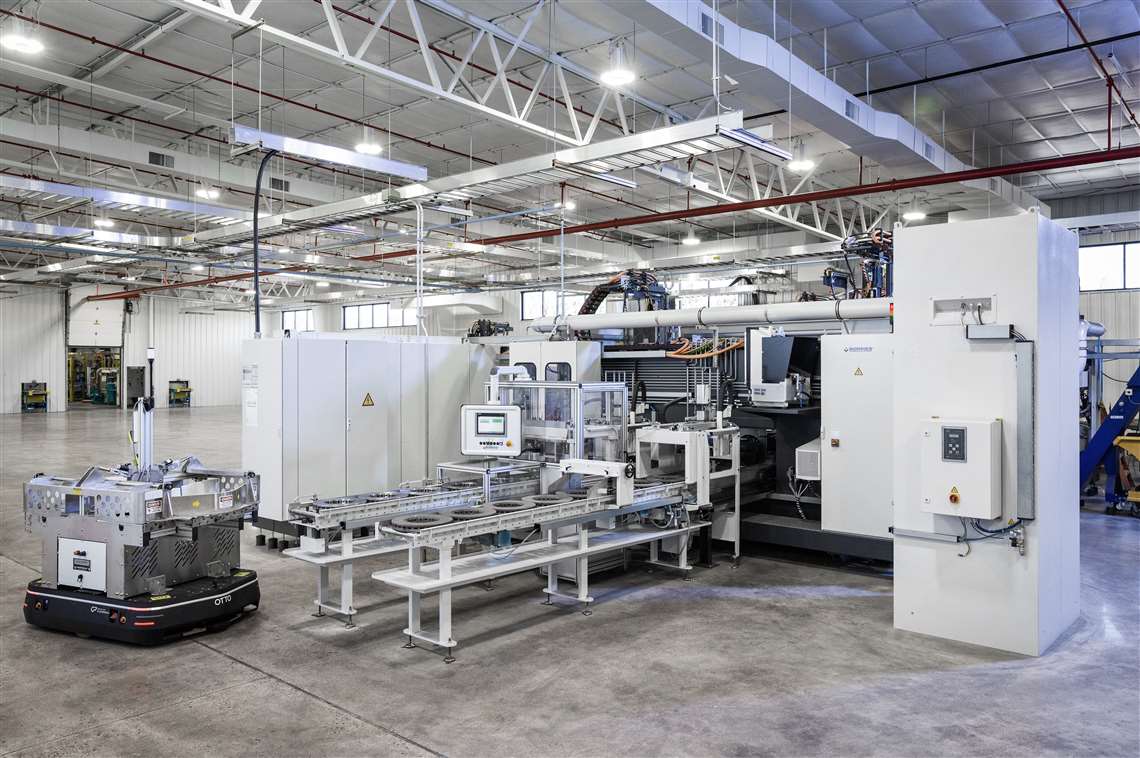 An air disc brake machining cell and automated guided vehicle (AGV) at the company’s machining center in Waupaca, Wis.
An air disc brake machining cell and automated guided vehicle (AGV) at the company’s machining center in Waupaca, Wis.
“In most cases, Waupaca’s level of process control and knowledge allow us to have multiple options of how to achieve the minimum requirements within those grades,” said Tyler Nooyen, manager of Research & Process Development, Waupaca Foundry. “Our typical metallurgical discussions with the customer revolve around best understanding which method will make the highest value part for the customer. To understand which process will give the best value we need to understand the application, machining cost drivers, and foundry cost drivers.”
In a recent case study published by the company, a manufacturer of commercial turf equipment wanted to improve the cost and performance of a gray iron rear bumper used on one of its zero-turn mower models.
The foundry’s engineering and manufacturing teams worked with the customer’s product engineering group to review the production processes and collaborate on the part. Waupaca Foundry identified cost drivers and production solutions to produce the part more efficiently. Then, its engineers designed a gray iron casting that converted a one-part piece into two parts to meet the manufacturer’s goals and the end-user’s expectations.
“Whether it’s that case study or others, the manufacturer needs a solution to a problem they may be experiencing with the part or assembly,” said Nooyen. “In all cases, the manufacturer is seeking a strength or performance improvement, cost reduction, and/or weight/mass reduction. With this project, the manufacturer had a quality and warranty issue to solve, while at the same time driving cost reduction.”
Written by Chad Elmore, this article originally appeared in the January 2021 issue of Diesel Progress.
STAY CONNECTED




Receive the information you need when you need it through our world-leading magazines, newsletters and daily briefings.
POWER SOURCING GUIDE
The trusted reference and buyer’s guide for 83 years
The original “desktop search engine,” guiding nearly 10,000 users in more than 90 countries it is the primary reference for specifications and details on all the components that go into engine systems.
Visit Now
CONNECT WITH THE TEAM










